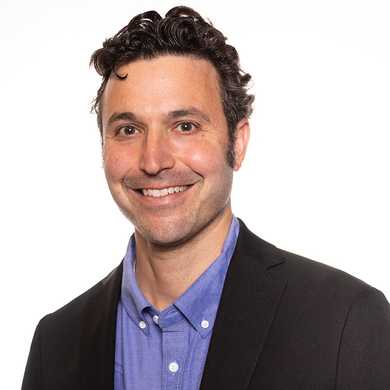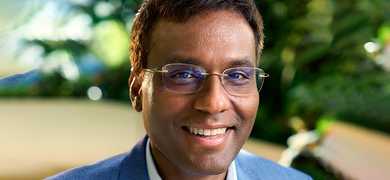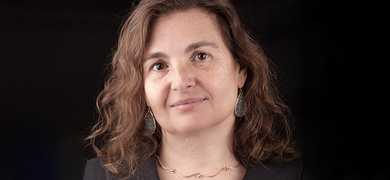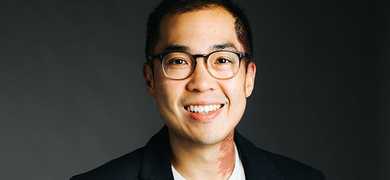
BIOGRAPHY
Why a Tech Power Player? For being a leader in AI-powered medical diagnostics.
Dr. Andrew Beck is a Brown University-trained pathologist who did his residency at Stanford University and then stuck around to earn a doctorate in biomedical informatics, which uses computers to analyze medical information.
That makes Beck an expert in two demanding fields. Still, he thinks he’s an underachiever—but in a good way. “Sometimes,” says Beck, “the biggest impact a person can make is being mediocre in two things, but being right at the interface of those two things.”
Beck is the cofounder of PathAI, a Boston company at the interface of artificial intelligence and medical diagnostics. PathAI builds machine learning models that can spot signs of disease or help pharmaceutical companies identify new drugs.
PathAI is revolutionizing the way diseases are diagnosed through pathology, a process that hadn’t changed in a century. Tissue samples were stained with dyes to highlight cells and make it easier for pathologists to spot cancers or damaged liver cells through microscopes. The work, which can involve looking at hundreds of slides each day, is demanding, tedious, and susceptible to errors. But today, slides can be digitally scanned and artificial intelligence systems trained to examine them.
PathAI specializes in searching for cancer, liver disease, and gastrointestinal disorders. Over the past eight years, the company has trained its AI using 20 million cell samples. And once AI is trained, it can examine samples faster and more thoroughly than the best physicians.
“Each image contains on the order of a hundred thousand to a million cells,” Beck says, making it impossible for humans to examine them all. “The only one that can really do all that is obviously a trained AI system.”
Kim Branson, global head of machine learning and AI at pharma giant GSK, says his company tests possible new drugs with help from PathAI, which runs an AI model that looks at thousands of cell samples to assess the effectiveness of new compounds.
The company is “great to work with,” says Branson. “They get computational pathology.”
PathAI has raised $255 million from venture firms such as General Catalyst, General Atlantic, and D1 Capital Partners. Beck, who declined to release financials, says the company is not yet profitable, but headed that way.
As more labs go digital, so will demand for AI diagnoses, says Beck. And that not only means opportunity for PathAI to grow, but also for medicine to improve.
“Pathology will continue to get better,” says Beck. “It’s always going to be better next year than it was the year before, because it’s powered by machine learning.”
— Hiawatha Bray, Globe Staff
CAREER MILESTONES
2016
Cofounded PathAI.
2013
Earned doctorate in biomedical informatics from Stanford University.
2006
Graduated from the Warren Alpert Medical School of Brown University.
SIMILAR PROFILES

BIOGRAPHY
Why a Tech Power Player? For being a leader in AI-powered medical diagnostics.
Dr. Andrew Beck is a Brown University-trained pathologist who did his residency at Stanford University and then stuck around to earn a doctorate in biomedical informatics, which uses computers to analyze medical information.
That makes Beck an expert in two demanding fields. Still, he thinks he’s an underachiever—but in a good way. “Sometimes,” says Beck, “the biggest impact a person can make is being mediocre in two things, but being right at the interface of those two things.”
Beck is the cofounder of PathAI, a Boston company at the interface of artificial intelligence and medical diagnostics. PathAI builds machine learning models that can spot signs of disease or help pharmaceutical companies identify new drugs.
PathAI is revolutionizing the way diseases are diagnosed through pathology, a process that hadn’t changed in a century. Tissue samples were stained with dyes to highlight cells and make it easier for pathologists to spot cancers or damaged liver cells through microscopes. The work, which can involve looking at hundreds of slides each day, is demanding, tedious, and susceptible to errors. But today, slides can be digitally scanned and artificial intelligence systems trained to examine them.
PathAI specializes in searching for cancer, liver disease, and gastrointestinal disorders. Over the past eight years, the company has trained its AI using 20 million cell samples. And once AI is trained, it can examine samples faster and more thoroughly than the best physicians.
“Each image contains on the order of a hundred thousand to a million cells,” Beck says, making it impossible for humans to examine them all. “The only one that can really do all that is obviously a trained AI system.”
Kim Branson, global head of machine learning and AI at pharma giant GSK, says his company tests possible new drugs with help from PathAI, which runs an AI model that looks at thousands of cell samples to assess the effectiveness of new compounds.
The company is “great to work with,” says Branson. “They get computational pathology.”
PathAI has raised $255 million from venture firms such as General Catalyst, General Atlantic, and D1 Capital Partners. Beck, who declined to release financials, says the company is not yet profitable, but headed that way.
As more labs go digital, so will demand for AI diagnoses, says Beck. And that not only means opportunity for PathAI to grow, but also for medicine to improve.
“Pathology will continue to get better,” says Beck. “It’s always going to be better next year than it was the year before, because it’s powered by machine learning.”
— Hiawatha Bray, Globe Staff
CAREER MILESTONES
2016
Cofounded PathAI.
2013
Earned doctorate in biomedical informatics from Stanford University.
2006
Graduated from the Warren Alpert Medical School of Brown University.
SIMILAR PROFILES
Advertisement






